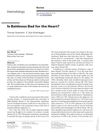 April 2024 in “Frontiers in medicine”
April 2024 in “Frontiers in medicine” Alopecia Areata significantly lowers quality of life and current treatments are inadequate, highlighting a need for better therapies and standardized treatment protocols.
4 citations,
June 2020 in “Cosmetics” Broussonetia papyrifera extract helps hair growth by regulating specific proteins.
36 citations,
December 2014 in “F1000 prime reports” The document concludes that Hidradenitis suppurativa is often underdiagnosed, lacks definitive treatment, and requires better awareness and management strategies.
48 citations,
April 2021 in “Journal of the American Academy of Dermatology” Topical corticosteroids are the best initial treatment for children's alopecia areata.
 January 2023 in “Springer eBooks”
January 2023 in “Springer eBooks” New understanding of hair loss could lead to better treatments.
5 citations,
July 2020 in “Recent patents on inflammation & allergy drug discovery” Childhood Alopecia Areata causes hair loss and requires varied treatments, with psychological support being crucial.
 43 citations,
March 2011 in “Journal of psychosomatic research”
43 citations,
March 2011 in “Journal of psychosomatic research” Kids with alopecia areata may experience more stress but not necessarily feel more anxious or depressed than others.
 17 citations,
May 2016 in “Journal of Psychosomatic Research”
17 citations,
May 2016 in “Journal of Psychosomatic Research” Illness perception affects mental health and quality of life in Chinese alopecia patients.
 32 citations,
November 2012 in “Aesthetic Surgery Journal”
32 citations,
November 2012 in “Aesthetic Surgery Journal” Hair restoration surgery has advanced, focusing on natural results and may improve further with new techniques and therapies.
 7 citations,
January 2020 in “PubMed”
7 citations,
January 2020 in “PubMed” Stem cell therapies show promise for treating hair loss, but more research is needed to understand their safety and effectiveness.
 4 citations,
May 2002 in “Aesthetic Surgery Journal”
4 citations,
May 2002 in “Aesthetic Surgery Journal” A new hair loss classification for women improves treatment, but careful patient selection is crucial for successful hair transplantation.
 19 citations,
January 2001 in “Dermatology + psychosomatics”
19 citations,
January 2001 in “Dermatology + psychosomatics” The review concluded that male pattern baldness is mostly seen negatively, affecting attractiveness and social appeal.
 January 2015 in “Springer eBooks”
January 2015 in “Springer eBooks” Some alternative treatments may help with hair loss, but more evidence is needed to confirm their effectiveness.
 356 citations,
September 2014 in “Journal of Clinical Research in Pediatric Endocrinology”
356 citations,
September 2014 in “Journal of Clinical Research in Pediatric Endocrinology” Childhood obesity is rising globally due to various factors, and early prevention and healthy lifestyle changes are crucial.
 2 citations,
January 2022 in “Aesthetic surgery journal. Open forum”
2 citations,
January 2022 in “Aesthetic surgery journal. Open forum” Aesthetic surgery can worsen depression and anxiety, especially in those with existing mood issues.
 2 citations,
October 1998 in “Family Practice”
2 citations,
October 1998 in “Family Practice” New oral treatment, finasteride, effectively and safely treats common hair loss.
January 2021 in “Journal of cosmetology & trichology” PRP therapy can be effective for early-stage common hair loss, with most patients seeing improvement, but there are inconsistencies in treatment methods.
 73 citations,
June 2003 in “Journal of the American Academy of Dermatology”
73 citations,
June 2003 in “Journal of the American Academy of Dermatology” Dermatologists need to understand African American hair-care practices to better treat their hair and scalp disorders.
 52 citations,
June 2009 in “Current Opinion in Endocrinology, Diabetes and Obesity”
52 citations,
June 2009 in “Current Opinion in Endocrinology, Diabetes and Obesity” The document concludes that hair transplantation and gene therapy may be important for future hair loss treatment.
 47 citations,
February 2015 in “European Journal of Clinical Investigation”
47 citations,
February 2015 in “European Journal of Clinical Investigation” The review suggests thorough evaluation and genetic testing for proper diagnosis and treatment of Chrousos syndrome.
 31 citations,
June 2018 in “Dermatologic Surgery”
31 citations,
June 2018 in “Dermatologic Surgery” Low-level light therapy safely improves hair coverage, thickness, and count in androgenetic alopecia patients.
 29 citations,
January 2018 in “International Journal of Trichology”
29 citations,
January 2018 in “International Journal of Trichology” PRP treatment helps hair growth and density with 70.7% success, but more research needed.
 18 citations,
January 2013 in “Postepy Dermatologii I Alergologii”
18 citations,
January 2013 in “Postepy Dermatologii I Alergologii” Puberty often causes skin issues like acne and excessive sweating, and treatments require patience as results may vary.
 18 citations,
October 2012 in “Dermatologic Clinics”
18 citations,
October 2012 in “Dermatologic Clinics” Early diagnosis and aggressive treatment are key for managing rare scalp disorders that cause permanent hair loss.
 17 citations,
October 2015 in “Medicine and Pharmacy Reports”
17 citations,
October 2015 in “Medicine and Pharmacy Reports” Animal models are crucial for learning about hair loss and finding treatments.
 12 citations,
January 2013 in “Bundesgesundheitsblatt - Gesundheitsforschung - Gesundheitsschutz”
12 citations,
January 2013 in “Bundesgesundheitsblatt - Gesundheitsforschung - Gesundheitsschutz” Older adults still engage in sexual activities but face challenges like health issues and lack of professional support, highlighting the need for better healthcare provider education and research on sexual fulfillment in old age.
 10 citations,
January 2005 in “Dermatology”
10 citations,
January 2005 in “Dermatology” Baldness may be linked to heart disease, but the evidence isn't strong enough to consider it a major risk factor.
 1 citations,
March 2021 in “Current Dermatology Reports”
1 citations,
March 2021 in “Current Dermatology Reports” Various treatments help hair growth, but more research needed for safety and effectiveness.
 1 citations,
November 2018 in “Elsevier eBooks”
1 citations,
November 2018 in “Elsevier eBooks” The document concludes that transplantology has evolved with improved techniques and materials, making transplants more successful and expanding the types of transplants possible.
 1 citations,
November 2008 in “Gerontology”
1 citations,
November 2008 in “Gerontology” Older adults use lifestyle drugs to improve life quality and appearance, but caution is needed due to side effects and potential abuse.
























